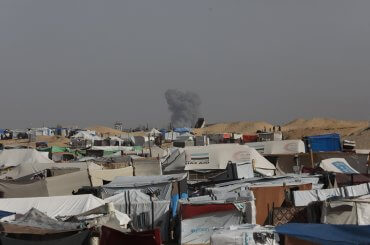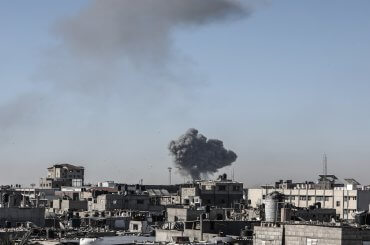No surprise here. Javad Jahangirzadeh, a ranking member of the Iranian parliament, has publicly accused IAEA chief Yukiya Amano of passing secret information about Iran’s nuclear activities to Israel.
A senior Iranian lawmaker accused the head of the United Nations’ nuclear watchdog on Sunday of passing confidential information about Iran’s nuclear activities to Israel.
In the latest sign of strained relations with the International Atomic Energy Agency, Javad Jahangirzadeh, a member of parliament’s presiding board, said IAEA chief Yukiya Amano would be to blame if Iran reduced its ties with the body.
“Amano’s repeated trips to Tel Aviv and asking the Israeli officials’ views about Iran’s nuclear activities indicates that Iran’s nuclear information has been disclosed to the Zionist regime (Israel) and other enemies of the Islamic Republic,” Jahangirzadeh was quoted as saying by Iran’s English-language Press TV.
“If the agency’s actions lead to Iran cutting cooperation with this international body, all responsibility will be with the IAEA director general,” said Jahangirzadeh, a member of parliament’s national security and foreign policy committee.

Mostafa Roshan,
picture released by Iranian Fars News Agency
Accusations of nuclear secrets being released via the IAEA, including identification of Iran’s top nuclear scientists, first appeared the same day as the assassination of Mostafa Roshan, January 11, 2012. However, those accusations were not picked up by the western press.
January 11, 2012, Press TV ‘IAEA leaked secret info to Iran enemy‘:
A senior lawmaker says assassination of Iranian scientist Mostafa Ahmadi Roshan proves that the confidential information provided to international bodies by Iran has been leaked to the country’s enemies.
“The International Atomic Energy Agency (IAEA) must be trusted by nations because nations and governments give their documents to the agency,” said speaker of the Majlis (parliament) National Security and Foreign Policy Committee Kazem Jalali on Wednesday.
“How the enemies of [the Islamic] establishment have obtained the names and information of our country’s elite is a question we would like to know the answer to,” he added.
Jalali stressed that the IAEA, international community and the UN nuclear agency’s member states using their membership against the Islamic Republic must be held accountable for their actions.
The lawmaker said the resemblance of the Wednesday assassination and other Zionist-American killings indicate that the “principle of assassination has been institutionalized in the American system and Zionist regime.”
Jan 14 2012: Iran accuses CIA & Israel, US warns Israel to back off
One other thing. And this might be the most important element of all in this drama. The WSJ article parrots many other news organizations that over the day or so have framed an upcoming visit to Iran by the International Atomic Energy Agency to inspect nuclear sites as something that developed lately: Iran has “agreed to host a delegation.” As if this visit is something new or a result of stepped-up pressure towards Tehran.
But as previously reported– Iran issued the invitation to nuclear inspectors on December 14th, one month ago today.
That’s not all that was in process. Iran’s Press TV:
“The latest terrorist attack comes as Iran has reached an agreement with the P5+1– Britain, China, France, Russian, and the United States plus Germany– to hold negotiations in Turkey.”
In other words, the assassination occurred right after Iran had already scheduled both IAEA inspections and negotiations with P5+1.
One day later US/Israel military drill cancelled, after US tells Israel to back off .
For more understanding of IAEA chief Yukiya Amano’s “balancing acts,” I recommend Seymour Hersh’s Iran and the I.A.E.A. as well as Wikileaks:
Classified By: Ambassador Glyn Davies, reasons 1.4 (b) and (d)
¶1. (SBU) In several meetings with USG officials before he
departed Vienna at the end of the IAEA General Conference,
DG-designate Amano displayed remarkable congruence of views
with us on conducting the Agency’s missions in safeguards
verification, nuclear security, and promoting peaceful uses
of the atom as well as on reforming Agency management.
Latest information from the Japanese Mission is that Amano
will return to Vienna in late November and occupy an office
in the IAEA during his final, intensive preparation to assume
office December 1. This report responds directly to
instruction ref A. End Summary.DG of All States, But in Agreement with Us
——————————————¶2. (C) In a meeting with Ambassador on the eve of the
two-week Board of Governors (BoG) and General Conference (GC)
marathon of mid-September, IAEA Director General-designate
Yukiya Amano thanked the U.S. for having supported his
candidacy and took pains to emphasize his support for U.S.
strategic objectives for the Agency. Amano reminded
Ambassador on several occasions that he would need to make
concessions to the G-77, which correctly required him to be
fair-minded and independent, but that he was solidly in the
U.S. court on every key strategic decision, from high-level
personnel appointments to the handling of Iran’s alleged
nuclear weapons program.¶3. (SBU) Amano shared with Ambassador Davies his public
stance on the role of the IAEA and the Agency’s contribution
to the global issues of proliferation, security, power, human
health and water management. More candidly, Amano noted the
importance of maintaining a certain “constructive ambiguity”
about his plans, at least until he took over for DG ElBaradei
in December. With a bow to the G-77, Amano felt obliged to
emphasize the importance of “balance” regarding the Agency’s
work in peaceful uses of nuclear technology. For staff
morale reasons, Amano planned to work on improving the
quality of management while publicly praising the current
standards and commending staff members for their dedication.



Annie, Here is a more detailed piece from Iran’s perspective on the current IAEA issue.
http://www.presstv.ir/detail/2012/09/23/263178/breaking-deadlock-over-irans-nuclear-talks/
Big surprise. An Iranian lawmaker with a conspiracy theory and a Mondoweisser who reports it as fact.
There are precedents for Western intelligence agencies infiltrating UN bodies to spy on middle eastern countries – UNSCOM, for example, which was created to monitor and disarm Iraq during the 90’s, was used by US intelligence agencies to gather intel on Saddam’s weapons program (in which there was cooperation with Israel, through Scott Ritter) :
http://www.washingtonpost.com/wp-srv/inatl/daily/march99/unscom2.htm
Also see:
http://www.pbs.org/wgbh/pages/frontline/shows/unscom/interviews/gellman.html
At a certain moment, people will realize that the intelligence is ultimately secondary, and that if Saudi Arabia, the US, Britain and Israel are dead set on weakening and destroying Iran as a viable, independent country, they will find any excuse to do it.
http://powerofnarrative.blogspot.fr/2006/11/how-foreign-policy-consensus-protects.html